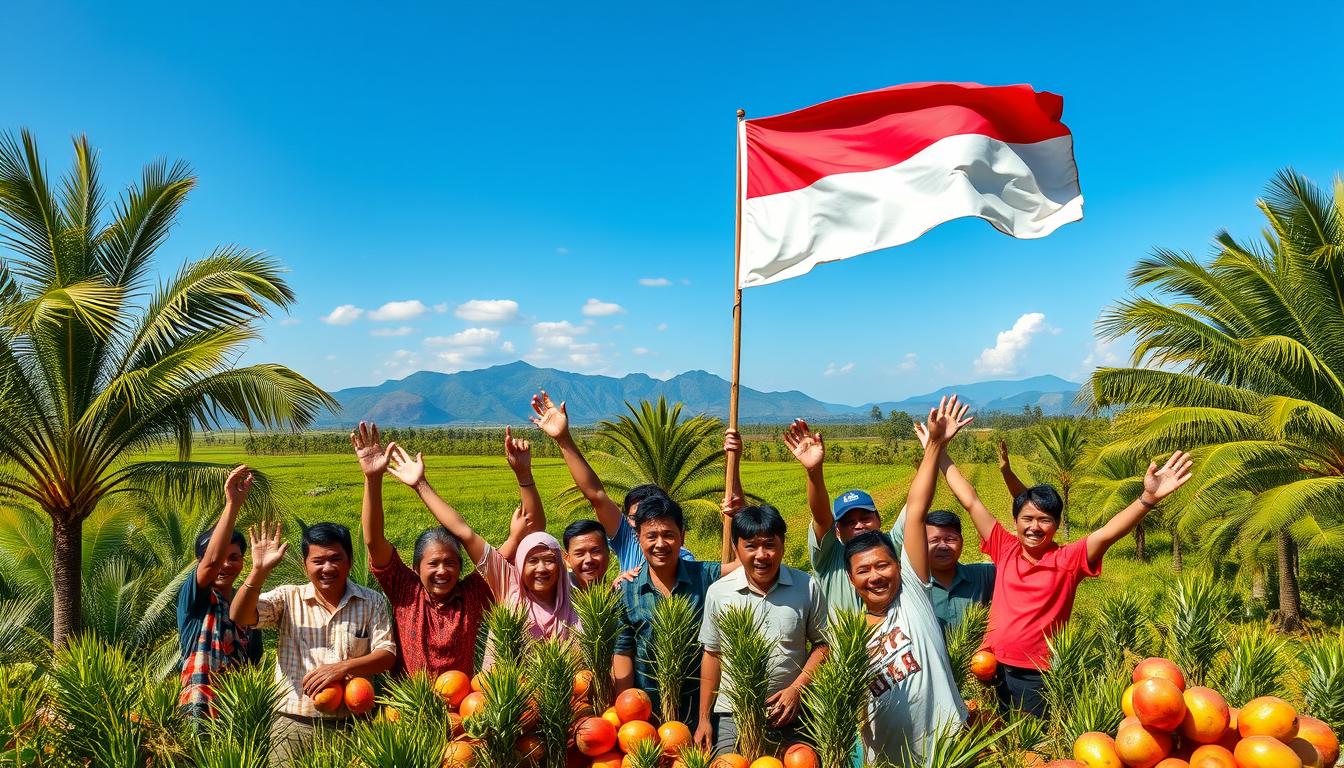Indonesia has won a big victory at the WTO. This decision will greatly change the palm oil industry’s future. It could make Indonesia a top player in the global market.
With this win, Indonesia will get better deals for palm oil. The industry’s future looks bright for Indonesia.
This victory will have big effects on the palm oil industry. Indonesia and other countries will need to adjust to new trade rules. Indonesia’s win will be key in shaping the industry’s future.
Breaking Down Indonesia’s Historic WTO Victory
Indonesia has won a big victory at the World Trade Organization (WTO). This win has shaken the global palm oil industry. The wto rulings on palm oil exports were a big issue. Indonesia said some trade practices were unfair and blocked its indonesia’s palm oil market growth.
This WTO ruling is a big win for Indonesia. It’s expected to change the global palm oil trade a lot.
The ruling could also affect the environmental impact of palm oil industry. Indonesia is a top palm oil producer. The country has faced environmental criticism before. Now, the WTO ruling might make the industry face more rules and checks.
Key Points of the WTO Ruling
- The WTO ruled that certain trade practices were unfair and hindered Indonesia’s palm oil exports
- The ruling is expected to increase Indonesia’s palm oil exports and boost the country’s economy
- The ruling may also lead to increased scrutiny and regulation of the environmental impact of the palm oil industry
Immediate Impact on Global Markets
The WTO ruling will quickly affect global markets. Palm oil prices and trade volumes will likely change. This ruling could also make the global palm oil market more competitive. Other countries might try to take advantage of the new trade rules.
The Future of the Palm Oil Industry: Post-WTO Decision Analysis
The palm oil industry is set for big changes after the WTO decision. Sustainability in palm oil production will be a major focus. Companies will aim to be more eco-friendly and cut down on carbon emissions. This move is expected to boost the industry’s image and ensure its long-term success.
The wto regulations on palm oil exports will also shape the industry’s future. These rules will make sure palm oil exports are fair and eco-friendly. As the industry adjusts, new chances for growth and progress are likely to come up.
Several factors will shape the palm oil industry’s future. These include:
- More demand for sustainable products
- Strict wto rules on palm oil exports
- Improvements in technology and production
As the industry grows, companies must focus on sustainability in palm oil production and follow wto regulations on palm oil exports. This way, they can seize new opportunities and help make the palm oil industry more sustainable and fair for everyone.
Economic Implications for Indonesian Palm Oil Exports
Indonesia has focused a lot on its palm oil sector for economic growth. The WTO ruling has brought new chances for Indonesian palm oil to grow. Now, Indonesian exporters can reach more markets and get better prices.
The WTO ruling is good news for Indonesia’s palm oil. It will help Indonesian palm oil to compete better globally. This could lead to more stable prices and more trade.
Market Access Enhancement
The WTO ruling has made it easier for Indonesian palm oil to enter markets. This means more exports and money for Indonesia. The trade agreements also help exporters get better deals with customers.
Price Stability Projections
The WTO ruling is expected to make prices for Indonesian palm oil more stable. With trade agreements, exporters can get better prices. This leads to more stable income for them.
Trade Volume Expectations
The WTO ruling is also expected to increase trade for Indonesian palm oil. With better market access and stable prices, exporters can produce and export more. This will bring more money and growth to the country.
Transforming International Trade Relations
Indonesia’s win at the WTO is changing how countries trade, especially in palm oil. The future of the palm oil industry is looking up. Indonesia and other nations might work together more.
Some important changes include:
- More chances for Indonesian palm oil to be sold abroad
- Better trade ties with countries that used to limit imports
- Opportunities for new trade deals and partnerships
With indonesia wins at the wto, Indonesia is set to lead in the global palm oil market. This ruling will likely shape the palm oil industry’s future. Indonesia will play a big part in international trade.
Sustainability Commitments in Palm Oil Production
The palm oil industry has faced criticism for its environmental harm. Many companies are now focusing on making palm oil production more sustainable. This change is key to reducing the industry’s environmental footprint.
By using sustainable methods, companies can cut down on deforestation. They can also protect wildlife and ensure fair labor practices. This is crucial for the future of palm oil.
Some important steps include:
- Responsible land use planning to prevent deforestation
- Implementation of environmentally friendly production methods
- Protection of wildlife habitats and conservation of biodiversity
Companies are also working on social responsibility programs. These programs aim to improve the lives of local communities. The development of strict certification standards is helping too. Now, companies must meet high standards to prove their products are sustainably sourced.
As more people want sustainable palm oil, companies must make sustainability a priority. This way, they can lessen their environmental impact. They can also boost their reputation and help create a greener future for palm oil.
Market Growth Opportunities and Challenges
Indonesia’s palm oil market is set to grow due to high demand from countries like China and India. The WTO regulations on palm oil exports are key in shaping the industry’s future. Indonesian palm oil exporters must follow these rules to keep their market share.
The market has big growth chances, especially in food and biofuel sectors. But, the industry also faces environmental and social issues. To tackle these, palm oil producers are adopting sustainable practices and getting certifications.
Key factors boosting Indonesia’s palm oil market include:
- Increasing demand from emerging markets
- Government support for the industry
- Investment in sustainable production practices
The WTO rules on palm oil exports open doors for innovation and investment. As the industry grows, we can expect new technologies and methods to emerge. This will drive further growth and development.
Technology and Innovation in Palm Oil Processing
Indonesia’s palm oil sector has seen big changes lately. It’s all about making things more efficient and cutting down on waste. Technology and new ideas are key in palm oil processing. Also, using sustainable methods is becoming more important as people and governments want greener production.
New ways to extract palm oil, like using enzymes or ultrasound, are getting popular. These methods help get more oil and waste less, which is good for producers. Also, better quality control means producers can make higher-quality oil for us to use.
Modern Extraction Methods
- Enzyme-based extraction
- Ultrasound-assisted extraction
- Membrane filtration
These new methods are not only better but also kinder to the environment. They use less harsh chemicals and lower temperatures. As Indonesia’s palm oil sector keeps growing, we’ll likely see even more green solutions.
Quality Control Advancements
Quality control is super important in palm oil making. New tech has helped make palm oil better. Now, producers can check and control their oil’s quality better, cutting down on bad stuff and making it more consistent.
Global Competition and Market Positioning
With indonesia wins at the wto, the palm oil industry in Indonesia is set for big growth. This WTO ruling opens up new chances for Indonesian palm oil to grow globally. It lets them take a bigger share of the market.
Indonesia competes with other big palm oil makers worldwide. But, the WTO win gives Indonesia an edge. It lets them send more palm oil abroad and boost their market standing. Indonesia’s palm oil is key to its future success, thanks to indonesia wins at the wto.
Regional Market Analysis
Indonesia’s palm oil is in high demand in places like India, China, and the European Union. Its good location and prices make it a top choice for these buyers.
Competitive Advantage Factors
What makes Indonesia stand out in palm oil is its big production, great climate, and government backing. These, plus the WTO win, help Indonesia grow its market share. It becomes a top player in the global palm oil market, shaping the future of the palm oil industry as indonesia wins at the wto.
- Large production capacity
- Favorable climate
- Government support
- Strategic location
- Competitive pricing
As the palm oil industry changes, Indonesia’s leading role is expected to stay strong. Indonesia wins at the wto and the future of the palm oil industry are closely linked to Indonesia’s growth in this field.
Investment and Development Prospects
Indonesia’s palm oil sector is growing fast, opening up new chances for investment and development. The rise in palm oil trade agreements has caught the eye of investors. They see the country’s vast natural resources and strategic spot as key. Key areas for investment include:
- Building new ports and transport systems
- Expanding current facilities like palm oil mills and refineries
- Using new tech, like green farming and efficient processing
These investments will boost Indonesia’s palm oil sector and support trade agreements. By teaming up, everyone involved can make the palm oil industry better and more profitable. Partnerships and collaborations are key to this growth.
As the industry keeps changing, new investment and development chances will pop up. With the right strategy, Indonesia’s palm oil sector can keep growing. This will help the industry and the environment.
Conclusion: Securing Indonesia’s Palm Oil Leadership
Indonesia’s win at the World Trade Organization (WTO) has set it up to lead the palm oil world. This victory opens doors for Indonesia’s palm oil exports. It also gives a chance to make the industry better and more competitive.
Being the biggest palm oil maker and exporter, Indonesia is ready to use this WTO win. It will help get Indonesia’s palm oil into more markets and keep prices stable. This could make Indonesia even stronger in the global market.
Indonesia can make its palm oil industry a role model by focusing on sustainability and social responsibility. By protecting the environment, improving standards, and helping communities, Indonesia can win over eco-conscious buyers. This will also show Indonesia cares about its people and the planet.
With its WTO win, Indonesia’s palm oil industry is set for growth and green practices. Indonesia’s leadership will help shape the future of palm oil. This ensures Indonesia’s economy and natural resources stay strong for years to come.

